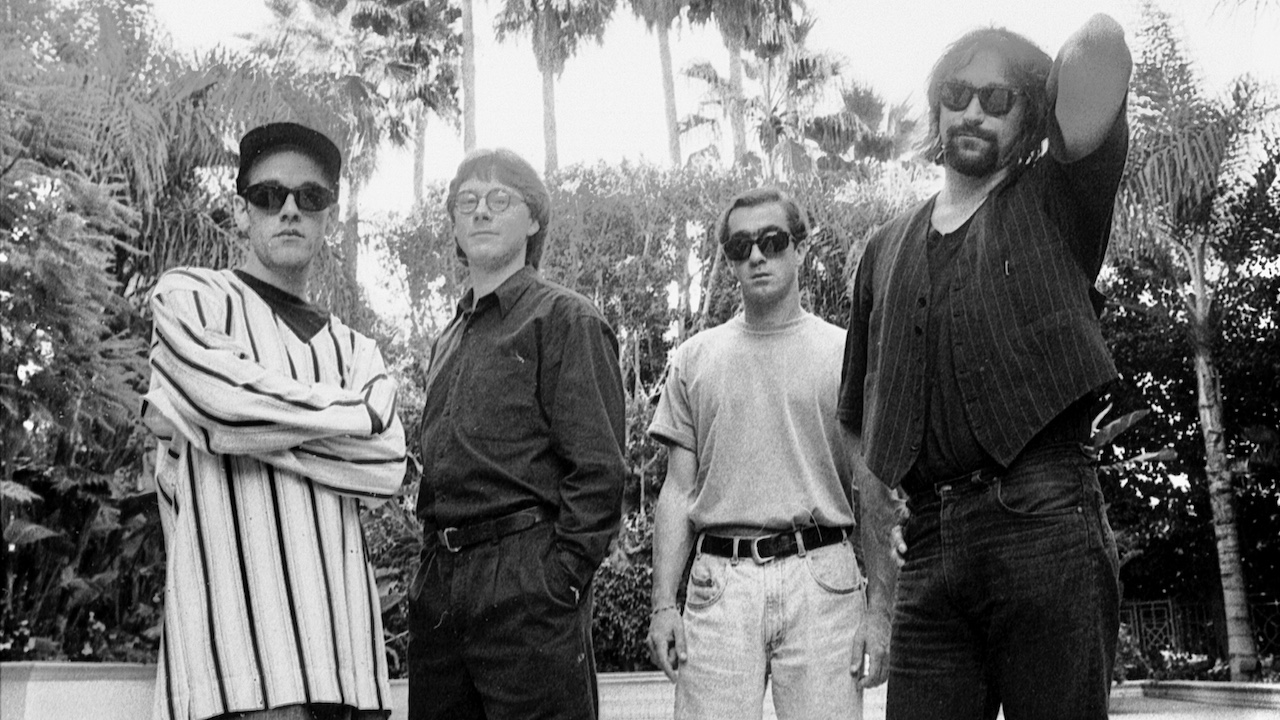“People talk to me on the street about it and say, ‘That song was really there for me when I needed it’”: the stirring 90s anthem inspired by Nazareth and featuring strings arranged by a member of Led Zeppelin that made this band absolutely massive
The story of the song that turned these arty, alt-rock trailblazers into one of the biggest bands in the world

Select the newsletters you’d like to receive. Then, add your email to sign up.
You are now subscribed
Your newsletter sign-up was successful
Want to add more newsletters?

Every Friday
Louder
Louder’s weekly newsletter is jam-packed with the team’s personal highlights from the last seven days, including features, breaking news, reviews and tons of juicy exclusives from the world of alternative music.

Every Friday
Classic Rock
The Classic Rock newsletter is an essential read for the discerning rock fan. Every week we bring you the news, reviews and the very best features and interviews from our extensive archive. Written by rock fans for rock fans.

Every Friday
Metal Hammer
For the last four decades Metal Hammer has been the world’s greatest metal magazine. Created by metalheads for metalheads, ‘Hammer takes you behind the scenes, closer to the action, and nearer to the bands that you love the most.

Every Friday
Prog
The Prog newsletter brings you the very best of Prog Magazine and our website, every Friday. We'll deliver you the very latest news from the Prog universe, informative features and archive material from Prog’s impressive vault.
R.E.M. went supernova in the early 90s. They had spent the previous decade elegantly shimmying towards a mainstream sound, their jangly college-rock growing ever more muscular and frontman Michael Stipe’s indelible way with a hook increasingly taking on a more anthemic bent. But no-one could’ve foreseen how huge they were about to become at the beginning of that decade. Over a pair of albums, 1991’s Out Of Time and swift 1992 follow-up Automatic For The People, they found the sweet spot between immersive fully-formed records and world-conquering hit singles.
Out Of Time had Losing My Religion, one of the strangest and therefore R.E.M-est of smash hits (it doesn’t even have a chorus!), but Automatic For The People had the song that went send the Athens, Georgia quartet into a whole new realm. Everybody Hurts has become such a cultural staple that it doesn’t even feel like R.E.M. own it anymore. It’s like one of those hymns where the credit reads “Trad. Arr” at the end – it has become a song that belongs to everyone.
The track itself is odd in how straightforward it is, a point where all of the band’s art-school leanings and left-field inclinations were honed into one of the most accessible pieces of music of the late 21st century. It’s both as delicate as a lullaby designed to help get babies to sleep and as robust as an emotional call-to-arms.
Stipe is the sort of lyricist who tends to avoid offering up deep dives into his work but it’s generally accepted that the singer wrote Everybody Hurts as an anti-suicide song aimed at a younger generation, something that has been confirmed by his bandmates. "I remember Michael saying something to the effect that he wanted younger people to not have to worry about metaphors," guitarist Peter Buck said of the simplicity in the song’s lyrics. "The only metaphor is in the bridge: 'throw your hand', which is a card-game metaphor."
Writing about the track in the liner notes to the band compilation In Time: The Best Of R.E.M. 1988-2003, Buck expanded on that idea. “The reason that the lyrics are so atypically straightforward is because it was aimed at teenagers,” he said. “I’ve never watch Buffy The Vampire Slayer, but the idea that high school is a portal to hell seems pretty realistic to me. It’s hard to everyone.”
After opting not to tour Out Of Time and throwing themselves straight into their next record, the band really had their studio game on by the time Everybody Hurts fell into their laps. In true studio-heads fashion, they had all decided to switch instruments and see what emerge - the song’s chiming, tranquil guitar part was originated by drummer Bill Berry, Buck describing his early version of the instrumental as “a one-minute country-and-western song”. “After a couple of weeks of arrangement hell, we settled on an Otis Redding vibe,” said Buck.
Stipe, though, had a different sonic touchstone in mind. Seeking inspiration, he was going back to a lot of his first musical loves during the writing of Automatic…, using them as a blueprint for what he wanted to say. “In terms of music I really cite as a young teen, Rock On by David Essex, I extrapolated into the song Drive,” Stipe told Rick Rubin in an interview for the producer’s Broken Record podcast in 2022. “That whole album is really referencing the 1970s and you can go song by song.” When it came to the emotive ballad that would become one of the biggest hits, it was a cover from the mid-70s by a crew of hairy Scottish rockers that the singer had in mind. “Everybody Hurts is Nazareth’s cover of Love Hurts, which was an earlier song from the 1950s or 60s.”
The latest news, features and interviews direct to your inbox, from the global home of alternative music.
Speaking to XFM’s John Kennedy about the track, Stipe said he couldn’t remember the moment he recorded what has become one of his most iconic vocal performances, but he can remember writing it. “I remember thinking, ‘This is really cheesy’,” he said. “which is a big part of who I am, that kind of sentimentality, that cheesiness, I really love pop music. But we worked in the production to try and prevent it from being too cheesy, so the use of a Casio drum machine, shitty little nothing [beat] and that somehow grounded it in enough of a non-cheesy place that the lyric could be what it was and the voice could be what it was.”
All the track needed next was some finishing touches, and what better way to put the icing on the cake than the sumptuous string arrangement that was overseen by none other than Led Zeppelin’s John Paul Jones. Bassist Mike Mills, who worked with Jones on the orchestral parts, told XFM that the idea for the Led Zep man’s involvement came from producer Scott Litt.
“Scott said, ‘Why don’t we get John Paul Jones?’ and at the time, if you thought about it, you knew he was capable of that kind of brilliance, if you listen to Kashmir, you’ll know that’s him, but it just didn’t occur to us,” he recounted. “We contacted him, we sent him the music, think he said, ‘That sounds great, I’ll give him a shot’, he came down and listened and we got along super well, we’re still friends to this day and he did some amazing work and really took the record to another place.”
And so Everybody Hurts was complete, a stirring ballad that became a hit around the world, a song that became bigger than any of its creators could’ve imagined. “It was a song that we thought was beautiful and had some sort of connectivity but you never know,” said Mills. “It’s a very universal theme and it did seem to reach a lot more people than we thought it would but we were probably as surprised as everyone.”
Since R.E.M. split up, Stipe has displayed a curious ability to separate himself from his own work and he's admitted on occasion that he's well aware Everybody Hurts is not everyone’s cup of tea. “It’s one of those songs where when you’re in the mood for that song, it’s exactly right,” he has said. “When you’re not in the mood for it, you can skip right over to the next one.”
This he doesn’t mind, though, especially when he puts it next to the amount of people who come up to him eager to relay the song's importance to them. “People talk to me on the street about it,” he said. “If someone says, ‘That song was really there for me when I needed it’, that’s the greatest compliment someone can offer you as an artist or a writer or creative person, there’s something that you made helped them or was there for them at some point.”
That was the reason he wrote it in the first place, and the reason its message sounds as poignant and rousing over three and a half decades later. Remind yourself of Everybody Hurts' brilliance below:
Niall Doherty is a writer and editor whose work can be found in Classic Rock, The Guardian, Music Week, FourFourTwo, Champions Journal, on Apple Music and more. Formerly the Deputy Editor of Q magazine, he co-runs the music Substack letter The New Cue with fellow former Q colleague Ted Kessler. He is also Reviews Editor at Record Collector. Over the years, he's interviewed some of the world's biggest stars, including Elton John, Coldplay, Radiohead, Liam and Noel Gallagher, Florence + The Machine, Arctic Monkeys, Muse, Pearl Jam, Depeche Mode, Robert Plant and more.
You must confirm your public display name before commenting
Please logout and then login again, you will then be prompted to enter your display name.


